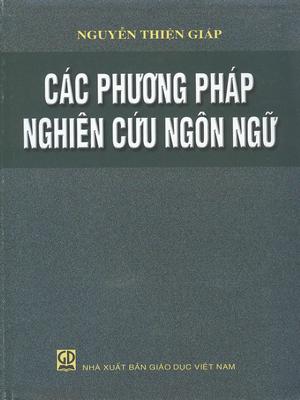Observing the landscape of modern linguistics, one can see quite a few different research approaches, and each approach, depending on its philosophical basis, has vastly different conceptions of the subject matter. It can be said that the history of linguistics is the history of schools of thought, and corresponding to them is a vast system of diverse methods and techniques, alongside some common techniques shared by all sciences. This characteristic is not unique to linguistics. However, theoretical negation in this field occurs at an extremely rapid pace. Clearly, gaining a comprehensive overview of relevant aspects such as the philosophical basis, development, continuity, advantages, and limitations of linguistic research methods in general is not simple, even for experienced researchers.

Professor Nguyen Thien Giap
In this context, Professor Nguyen Thien Giap's *Methodology and Research Methods of Linguistics* was published, providing readers with a very useful reference guide on methodology. The positive impact and influence of this work far exceed the three modest goals the author set: (i) The distinction between schools of thought, (ii) The contributions, inheritance, and development of each school of thought, and (iii) Some current research trends.
It can be said that, compared to the book *Methods of Language Research* by the same author, published by the Education Publishing House in 2009, the work under consideration is far more substantial in terms of its depth, timeliness, relevance, theoretical framework, applied illustrations, and even maturity.
Titled "Methodology of Linguistics," the first part of the book presents the following topics in order: Dialectical materialism methodology in linguistics, the methodology of the Geneva School, the methodology of the Prague School, the methodology of the Copenhagen School, the methodology of the American structuralist school, the methodology of the London School, the methodology of generative linguistics, the methodology of cognitive linguistics, and the methodology of anthropological linguistics.
It is evident that the most essential, yet sometimes most difficult to grasp, concepts, not limited to methodological content, are presented in the book in a surprisingly clear and simple manner. Each school of linguistics is identified and examined under three foundations: (i) General introduction, (ii) Basic theory, and (iii) Philosophical basis. Besides presenting theoretical axioms in a comprehensive manner with convincing explanations that shed light on certain aspects of methodology, albeit with varying degrees of emphasis, the book does not forget to mention the application and achievements of Vietnamese linguists related to each school. Besides classical methodological knowledge, this section also comprehensively updates on topical scientific issues that have only recently become known in Vietnam, such as the methodological system of cognitive linguistics and the extended methods of anthropological linguistics (see: Methods in cognitive linguistics, 2007 and Language, culture and society, An introduction to linguistic anthropology, 2007). This shows that, to produce pages that at first glance seem simple, the author had to work diligently, read a huge amount of material, and within that complex matrix of words, only a seasoned and scientifically astute person could extract the necessary and sufficient knowledge to portray each topic required by the book's structure.
Part two, presenting methods of language research, after establishing some key terms as a starting point, the book addresses: external explanatory methods; internal explanatory methods; logical, mathematical, and psycholinguistic methods; comparative-historical methods; historical-comparative methods; and contrastive methods.
While the previous section presented rather academic issues in a relatively simple manner, demonstrating the scholarly erudition, profound understanding, and proactive approach to knowledge distribution and content guidance of a sharp theorist, this section reflects a different perspective. Through the analysis of illustrative examples, the presentation of the internal and external meanings of certain terms, and the linking of issues using familiar structures, the reader also recognizes that behind these dedicated textbook pages lies a wealth of experience from an educator who has devoted his life to linguistics.
This monograph marks the first time that issues concerning the research methodology of a narrow discipline have been published in Vietnam. It can be said that the work has provided a comprehensive overview of some key milestones and relevant tools in the cognitive development of world linguistics, and has systematically introduced some essential knowledge that cannot be overlooked when discussing linguistic research methodology.
This is an essential book for researchers, graduate students, postgraduate students, undergraduates, and anyone interested in linguistics. It will undoubtedly contribute to improving the quality of research papers, theses, and dissertations in linguistics, as, depending on the topic and field of interest, the Methodology and Research Methods of Linguistics will provide many practical and useful suggestions, whether understanding methodology as a holistic approach or as a means of discovering local truth.
